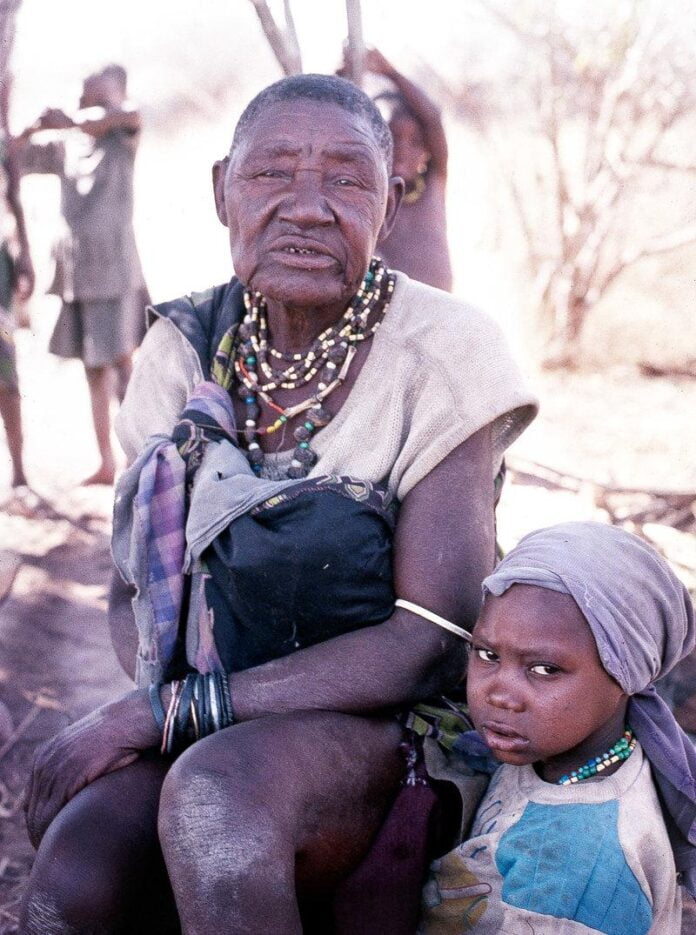On the rearing of human babies
This scene is indicative of the imaginary – persistent in many of us – about how early humans lived. A dramatic image that evokes danger and male heroism. And it coincides with the dominant ideas in the West about the division of labor and the nuclear family that prevailed in the 60s, when the theory of the so-called "hunter man" first emerged.
The most recent research and theories, however, most of which created by women, draw a very different scenario, more similar to an unconventional independent film than a Hollywood blockbuster, in which the star is Grandmother.

Kristen Hawkes is an anthropologist at the University of Utah. She tries to trace our past by studying modern hunters like the Hadza, who have probably lived in the area that is now northern Tanzania for thousands of years. Groups like this are closest to a lifestyle similar to that in which our earliest human ancestors lived.
During many extended field visits, Hawkes and her colleagues noted how much food a large number of members of the Hadza community brought home. And he reports that, by tracking the success rates of each individual, "almost always (men) failed to bring home a large animal." The hunters went out nearly every day and had 3,4 percent of the trips successful. This means that, at least in this society, assumptions about hunting don't hold up. If the Hadza's survival depended on bushmeat, they would have starved to death by now.
So if the father didn't bring home the food, who did?

After spending considerable time with the women in their daily foraging for food, the researchers were surprised to find that it was women, both young and old, who provided the majority of calories for their families and group members.
Mostly they dug up tubers from underground, which were quite difficult to extract. A mother's success in harvesting tubers correlated with her child's growth. But something surprising happened when the mother had a second child: the original correlation broke down and a new one emerged, with the amount of food that the grandmother collected.
Hankes describes this discovery as "amazing". In these societies, the foraging of the grandmothers is more important than that of the fathers for the survival of the grandchildren. Mom and grandmother feed the little ones, not the hunter man.
This discovery caused Kristen Hawkes to completely revolutionize what she thought she knew about human evolution. Grandmothers in this type of environment are crucial to the survival of children. Thus it is no coincidence that humans are the only great ape species in which females live so long after reproductive age. If having a grandmother is so useful for the survival of the little ones, natural selection may have determined a selection of increasingly older women (a characteristic that would later also pass to men).

Also Sarah Hrdy, a primatologist at UC Davis, studies the connections between rearing and human evolution. You have spent a lot of time thinking and writing about it. She argues that “an ape that gave birth to such expensive, slow-growing babies would never have evolved without the mothers getting a lot of help.” Foremost among these helpers, she suggests, must have come from grandmothers, probably along with many other helpers, fathers, aunts and uncles, brothers and sisters.
If sons and daughters were raised by people other than their mother, Sarah Hrdy thinks it was this factor, as well as the timing of evolution, that led humans to develop the profound social orientations that characterize our species - worrying so much about thoughts and the intentions of others.
He writes: “Often we try to explain the fact that humans are good and cooperative by saying, well, we need to cooperate to be successful on big hunts or to defeat neighboring groups. What is not explained is why these traits emerged so early."
It refers to boys and girls, and to obvious social traits we can observe even before they walk – such as pointing, sharing, and paying attention to social cues such as smiling or frowning. From the perspective of a small human, the caregiving situation is very different from that of any other species of baby great apes. Bonobo chimpanzees, orangutans and gorillas are all cared for exclusively by their mother. And these primate mothers are extremely protective — sometimes not letting any other monkey touch the baby for months after birth.
For human babies however, other adults are normally present near them at birth or soon after to help their mother and then later to help and feed them.
We are the only species that does this. Hrdy argues that infants have an incentive to pay attention to what others do around them, and think and feel differently than do other monkey species. Knowing who could help or hurt you, and learning how to ask could be the difference between eating well or going hungry—perhaps even the difference between life and death in some cases.
Michael Tomasello is a developmental psychologist at Duke University and the Max Planck Institute. After a career dedicated to studying the cognitive differences between children and monkeys, he found that many monkeys show nowhere in level of interest in sharing and cooperating, two behaviors that arise very early in humans: "As individuals, humans are not much more smarter than monkeys. What makes the difference is the fact that we can put our heads together with those of others, communicate, collaborate and learn from others and teach others. Little humans are adept at cooperation and intentionally share in ways that apes don't."
Tomasello initially theorized that the pro-social traits of children serve to prepare the little ones for the tasks they will have to face as adults, in line with the hypothesis of the Hunter Man. He now thinks that HRDY's proposal that human children are socially oriented through shared care and nurturing as infants is a more compelling theory. These traits arise so early in human life that it makes more sense to think that they are suited to overcome childhood living conditions rather than necessary for future adult hunting behaviors.
It is the ability to “put our heads together” – as Tomasello does – that has allowed humans to survive, thrive, and go about the world. While the men were out hunting, grandmothers and girls and boys built the foundation for the success of our species – sharing food, cooperating on ever more complex levels, and developing new social relationships.
Simply put, humanity's success may have depended entirely on the unique way our female ancestors raised young. Thank you Grandma.
John Poole
Here the PDF of the original article
For more information:


